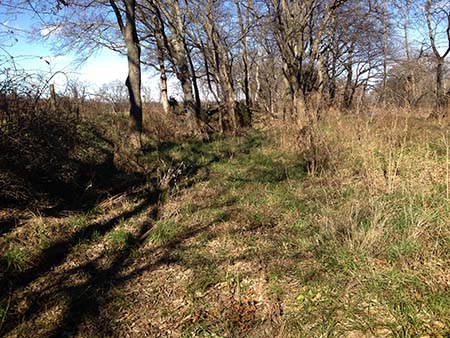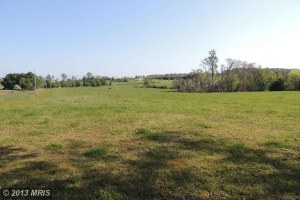In Like a Lion

I got out of Arlington later than I had anticipated- hey, it was Sunday, right, and after that unpleasant Spring Forward that cost us an hour of sweet sleep?
I had several good ideas that did not come to fruition, but the drive was pleasant under crisp blue skies, a little cooler than Sunday, but with the promise of seasonal temperatures to start the week.
All save a few swatches of white were gone from the Culpeper fields, and I stopped at Croftburn Farms to get some dinner and breakfast materials. There were still two dozen eggs left from the local farms, a welcome sign, but looking in the white refrigerated case, the offerings were pretty well picked over. No sausage-with-sage left, and the local steaks were a bit pricey. I sighed and thought about imposing some discipline on purchasing.
So, eggs, an onion, maple sausage and a pound of local hamburger rounded out the purchase, as I got the idea of doing a loaf of 2/3rds beef and a third sausage- I know, the maple sweetness angle kind of threw me, too, but I planned to fold in some corn meal, an egg to bind it all, adobo, garlic and pepper for seasoning and chop up half of a good Vidalia onion.
Andrew, the master and commander of Croftburn, asked about my time down in the Keys, and I almost went into a reverie right in front of the meat counter. He concluded with the admonition that the Russians were probably going to be departing early in the afternoon. I refrained from asking about the Countess, Natasha’s lovely daughter, and the mother to darling Sasha, the Czarina-in-waiting.
The adults of our generation are hoping for romantic developments between Andrew and the Countess. She is quite Russian, and unburdened by some of the conventional American wisdom about the role of men and women. She is stunning in that regard.
Anyway, with the knowledge that they might be taking off early, I swung into their muddy lane in the Panzer before arriving at Refuge Farm. The snow melt has not been fully absorbed into the red clay soil, and at this time of the year I marvel that the great armies that marched on foot and dragged equipment by horsepower maneuvered these very fields in this very mud.
The lift gate was up on the silver SUV, so Andrew’s intelligence was quite accurate, which made me suspect he was in regular communication with the Countess, a good thing, in my estimation. A formal relationship would cement the influence of our little clan on the local food chain, right?
Anyway, I shut down the car and tossed the keys on the driver’s seat as Natasha emerged from the 1910 white farmhouse. She was carrying a glass of Old House Winery’s Chardonnay, and I asked impertinently, where mine was. She smiled and handed me the glass, saying she would get more, and that she had a few minutes to stand and watch bees with Mattski in the back pasture.
I took a sip while she went back to the kitchen and then we walked the squishy grass back past the cinder block garage and past the elongated fenced truck patch that Natasha is already germinating young vegetables to get in the ground when the threat of hard frost is gone.
Mattski was sitting in one of the green plastic Adirondack chairs, observing his bees. The rascals were quite busy, coming and going from the slot on the bottom of several stacked white wooden boxes that hold the hive in a striated society not much different than ours.
“I am going for seven hives this year,” said Mattski. “I am committed to this. We will be drinking mead in two years. I am serious.” I nodded, thinking that alcohol produced from the bounty of this very field would be pretty cool.
Natasha stood as we talked about the change in the weather, the way March comes in like a lion and leaves less so, the timing of the last hard frost, the great melt, and Biscuit the Wonder Spaniel ran around wagging her tail. She was perfectly in tune with the raptor sculling in the skies above and the swarming bees. “The workers are hard at it.”
“They are all drone males, aren’t they?”
Natasha smiled thinly. “Is not. They are all females. The idea that men work is absurd.”
Mattski and I made haste to agree, and it was not long until we got to the matter at hand, which was, whither Crimea?
This is a personal issue down in Culpeper. Natasha is from Yalta. She grew up there, before marriage and Moscow and the Rocket Institute called her up to Moscow. She has been in touch with Aunts and Uncles and the video coverage of the crisis shows her roads and corners that she knows well.
I asked her what was going to happen, and if the people of the Crimean Peninsula were going to opt to be Russian, or stay Ukrainian. “Is Putin coming in like the month of March?” I mused.
“Is hard question. I am split- I have both sides to me, and I don’t know what will happen. When I was young girl we were all Crimeans. I think the crisis means they will start being Russian, and Greek, and Jew again as society fragments into its components.”
Then we talked about the social makeup of the peninsula, and the differences between east and west Ukraine. And of course we remarked on the boldness of Mr. Putin, and Article 5 of the NATO pact, which holds that “an attack on one member state is an attack on all.”
A zephyr brought the still present chill breeze through the weft of my sweater, reminding me the winter was not yet gone. We wondered about the viability of the Baltic States and their ability to survive an assault from the East, and the marvel that Poland was again in the middle of everything. Then came the question of whether the West would be willing to launch WW III to protect East Europe was a question that went along with where the new hives were going to go, and how the newly planted vines had survived the winter, and when the first tomatoes would be in.
I thought a thick and mildly spicy tomato sauce would be nice to add to the simmer of the loaf, and perhaps finish it with some Mexican four-cheese grate from the only non-local ingredient in the mix. I resolved to do something to support local cheese, and we finished the glass of white wine. Sasha appeared in tall rubber boots, and wanted to check the Groundhog trap and see if they had caught one of the big rodents. We traipsed across the field to the derelict barn and chicken coop where the mesh trap, baited with small domestic apples, sat empty.
Then back to the house where Natasha’s son Grigori reported that the chicken was done, and the early dinner ready to be set out. I took my leave to do the opening chores, and put together dinner and maybe have another glass of wine. The extra daylight in the evening was welcome, as much as I hate the loss of light in the morning, I have to tell you that the savory smell of the loaf and the quiet tranquility of the back deck were a splendid way to conclude a day that started urban and ended country.
The question that remains for me is whether this is like 1914, or if it is as simple as acquiescing to the equivalent of Hitler’s annexation of the Sudetenland, you know? The loaf, when cooked for two hours at 325 degrees was savory, local, and delicious.

Copyright 2014 Vic Socotra
www.vicsocotra.com
